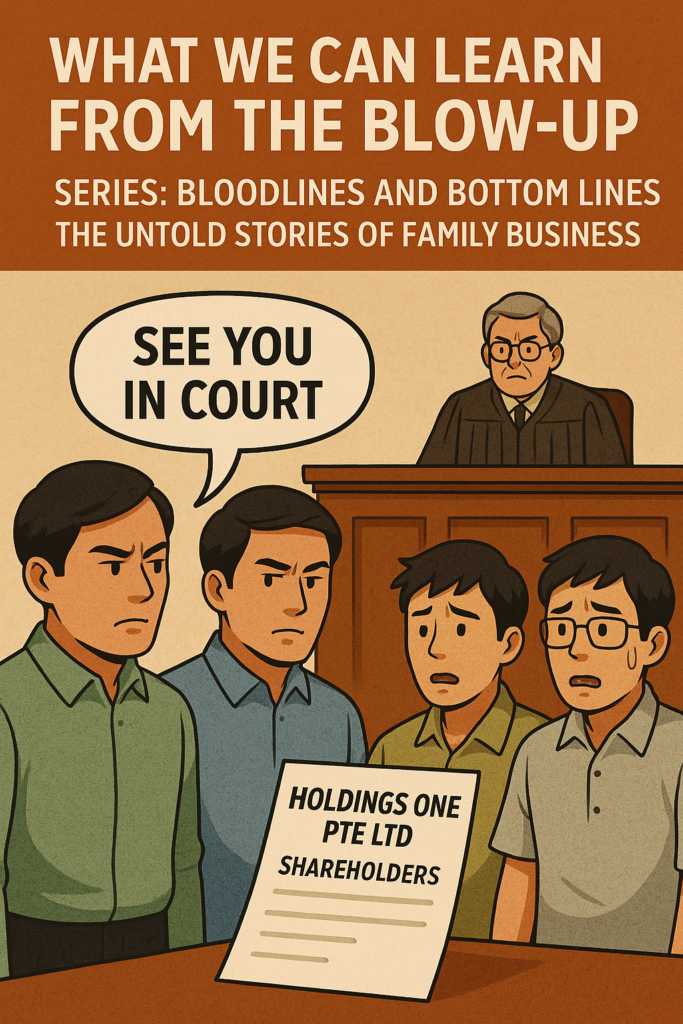Series: Bloodlines and Bottom Lines – The Untold Stories of Family Business
Remember the Tan brothers? The family who went from “we share everything” to “see you in court”?
Today, we’re going deep into what actually happened when things got messy. And spoiler alert: it didn’t start in the courtroom—it started in silence.

Because the biggest risks in family business aren’t bad markets or bad products.
They’re bad assumptions.
Let’s break it down.
🧨 The Build-Up: Years of Unspoken Expectations
The Tan brothers (based loosely on a real case, with names changed to protect privacy) had all worked together since the early days. Some chipped in money, some managed projects, some did more “behind the scenes” work. There was this unspoken agreement that the business belonged to all of them.
But here’s the catch:
Only the two eldest brothers—Ah Fong and Ah Kheng—were listed as shareholders of their main company, Holdings One Pte Ltd
The others? They trusted that their “sweat equity” would eventually be recognised.
Fast forward 20 years. Millions in property assets. And suddenly, in 2019, the younger brothers—Ah Tong, Ah Teng, and Edwin—checked ACRA… and saw their names had been quietly removed from the shareholder list.
Their blood ran cold.
⚖️ The Court Case: When Family Becomes Litigants
After several ignored demands and awkward family meetings, the brothers did something no one wants to do—they filed a lawsuit.
What followed was a full-blown trial:
- Each side lawyered up (well, some represented themselves—never a good idea).
- Old emails and WhatsApp messages were dug up.
- Contributions were disputed: “You didn’t help!” vs. “I mortgaged my house!”
- A handwritten “Company Resolution” from 2012 showed they once agreed to divide the shares equally—but it wasn’t executed properly.
- One brother claimed the shares were meant to be sold (and not given) but payment was never made.
At the heart of it all? Trust… broken.
🔍 The Judge’s Take: Intent Matters, But So Does Proof
The court ruled that there was an express trust in place—based on years of consistent behavior, verbal assurances, and that 2012 document.
In short, the younger brothers had a claim.
But it didn’t come easy. It took:
- Years of litigation
- Personal attacks in open court
- Legal fees (think: six figures)
- And the total breakdown of sibling relationships
No CNY reunion dinner was going to fix that.
🧠 Lessons From the Tan Brothers’ Breakdown
Let’s not waste their pain. Here are 5 takeaways every family business should note:
1. 🧾 If you’re not on ACRA, you’re not a shareholder.
It doesn’t matter what was said, promised, or WhatsApp-ed 10 years ago. In the eyes of the law, if your name isn’t on the company records, you don’t own squat—unless you can prove a trust (which is not easy and never pretty).
✅ Action: Check your ACRA listing today. Better to be disappointed now than blindsided later.
2. 🤝 Good intentions don’t replace proper documentation.
The 2012 agreement would’ve saved everyone… if they had followed through with legal share transfers. But they didn’t.
✅ Action: Don’t stop at a handshake or internal memo. File the documents. Update ACRA. Get signatures. Treat it like a business, not a birthday party.
3. 🧮 Contributions must be visible, valued, and recorded.
One brother claimed he loaned money. Another said he mortgaged his home. But without documentation or agreed valuation, it was all just he-said-she-said.
✅ Action: Keep records. If you’re contributing capital or property, make sure it’s tracked—and agreed upon by all.
4. 👨⚖️ Litigation is a last resort. And it’s rarely worth it.
Even when you “win,” you lose—time, money, and relationships. The Tan brothers may have resolved the shareholding issue legally, but they lost their bond as siblings. And no amount of dividends can buy that back.
✅ Action: Explore mediation early. It’s faster, cheaper, and often leads to a more dignified outcome.
5. 🧭 Unclear succession = guaranteed chaos
The eldest brothers made decisions on behalf of everyone. But when there was no roadmap for leadership, ownership, or handover… mistrust festered.
✅ Action: Start succession planning early. It’s not just about who takes over. It’s about building shared understanding, trust, and governance.
🎙️ One Brother’s Words Still Haunt Me…
“I never wanted the money. I just wanted to know my contribution mattered.”
That hit hard. Because that’s the heart of many family business disputes—it’s not greed.
It’s the hurt of feeling unseen.
Next Up in Part 5:
“Peace Over Profit? Rebuilding After the Rift”
We’ll explore how some families have managed to reconcile, rebuild trust, and even come back stronger—plus, when it’s better to walk away for the sake of love.
💬 Have you seen a family business fall apart—or survive a rough patch? What helped or hurt the most? Drop uncle an email please (TalkTo@unclehuat.com)
Let’s help more families build legacies without losing each other in the process.